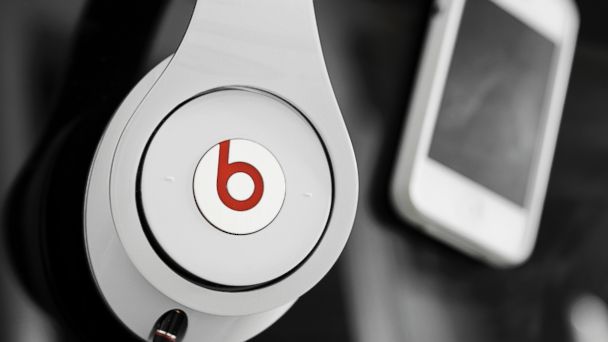Why Apple May Buy Beats

(Photo Credit: David Ebener/AP Photo
Apple used to be cool all on its own. So does it really need to spend more than $3 billion to bolster its street cred? That's what some Wall Street analysts are wondering. The Financial Times says Apple is "closing in" on $3.2 billion acquisition of Beats Electronics, the headphone maker and music streaming distributor founded by hip-hop star Dr. Dre and well-known record producer Jimmy Iovine. If confirmed, this would be Apple's biggest takeover so far. The deal would add Beats headphones to the Apple lineup, but the biggest prize would be the streaming service, which might be needed to beef up iTunes. Spotify and other music subscription sites are growing fast with rapidly rising sales, but total downloads - the core of the iTunes Store - fell 2 percent last year. A Beats deal could bolster iTunes Radio. The sale would make Dr. Dre rap's busiest man. Forbes says this would "nearly double" the value of Dre's holdings.
While one deal may be in the works another one has been called off. A merger that would have created the world's largest advertising firm has been abandoned. Omnicom and Publicis say they have scrapped their merger plans that would have created the world's largest advertising firm. The companies issued a joint statement saying they mutually agreed to call off the $35 billion deal announced in July because they were not able to complete the merger in a reasonable time frame. They did not give details, but The Wall Street Journal reported that the issues included getting tax and regulatory approvals, and debates over which company would be listed as the acquirer of the other.
Burger King is beefing up its breakfast menu. Ad Age says early morning customers will be able to eat Whoppers and other burger products as well as chicken sandwiches and fries. Breakfast is a growing battleground for fast food chains, especially since Taco Bell decided to join a growing list of competitors. "Burger King is currently advertising its Breakfast Value Menu," Ad Age says. "Wendy's has dabbled in breakfast, most recently testing it in hundreds of stores, but opted to decline from moving forward because it couldn't get the traction it needed for success." Breakfast accounts for about 25 percent of McDonald's US business.
A national food industry group says it will file suit in federal court challenging Vermont's new law that requires labels on genetically modified foods. The Grocery Manufacturers Association says that government has no compelling interest in warning consumers about foods containing genetically modified ingredients. The group maintains the foods are not unsafe.
Those vanishing photographs many kids posted on Snapchat may not have gone away after all. The app firm has settled charges with the Federal Trade Commission that it misled customers. Snapchat told them their messages would disappear, but the FTC says the firm misrepresented its data-collection policies and didn't do enough to protect user's personal information. Snapchat has neither confirmed nor denied the charges. Under the agreement, the app will face inspections by privacy auditors for the next 20 years.
Richard Davies Business Correspondent ABC News Radio abcnews.com Twitter: daviesnow